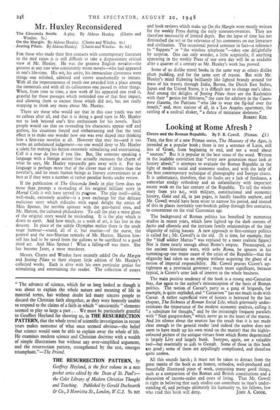Looking at Rome Afresh ?
Cicero and the Roman Republic, By F. R. Cowell. (Pitman. £1.) THIS, the first of a new Pitman series, The Measure of the Ages i3 intended as a popular book ; there is not a sentence of Latin, ;till less of Greek, from beginning to end, and not a word about "sources." But it is popular in the best sense of the word. Written in the laudable conviction that "every new generation must look at history afresh," it attempts to evaluate the Roman Republic in the light of modern social and economic studies, and with the help of the best contemporary technique of photography and Isotype charts. It is unfortunate, therefore, that its faults are a lack of freshness, a somewhat stodgy orthodoxy and an unfamiliarity with important recent work on the last century of the Republic. To tell the whole story from 510 B.C., with military, constitutional and economic history, Geist and all, in 300 pages, is hardly feasible anyhow, and Mr. Cowell would have been wiser to narrow his period, and instead of this in places inevitably text-bookish gallop through five centuries, to concentrate on the vital Ciceronian age.
The background of Roman politics has benefited by numerous studies in recent years, which have lighted up the dark corners of factio and clientela and the intricate family relationships of the tiny oligarchy of ruling houses. A new approach to first-century politics is called for ; Mr. Cowell's is the old. (It is time, for example, that the "bluff soldier Marius" was replaced by a more realistic figure.) Nor is there nearly enough about Rome's empire. Preoccupied, as the ancient historians were, with urbs Roma, he ignores in his summing-up one major cause of the crisis of the Republic—that the oligarchy had taken on an empire without acquiring the ghost of a notion of imperial responsibility. Mr. Cowell praises Cicero's up- rightness as a provincial governor ; much more significant, because typical, is Cicero's utter lack of interest in the whole business.
The main positive tendency of the book is a strong anti-Caesarian bias, due again to the author's misconception of the basis of Roman politics. The notion of Caesar's party as a gang of brigands, for example, is quite exploded, and " Caesarism " has not much to do with Caesar. A rather superficial view of history is betrayed by the last chapter, The Sickness of Roman Social Life, which grievously under- estimates the importance of the modern economic analysis, calling it "a substitute for thought," and by the irritatingly frequent parallels with "Nazi gangsterdom" which never go to the heart of the matter. And his silence about the sources has the result that it is not made clear enough to the general reader (and indeed the author does not seem to have made up his own mind on the matter) that the highly- coloured picture of the antique virtues from which Rome degenerated is largely Livy and largely bunk. Isotypes, again, are a valuable tool—but essentially as aids to Gestalt. Some of those in this book are good • some of them are appallingly complicated, and therefore quite useless.
All this sounds harsh ; it must not be taken to detract from the great merits of the book as an honest, orthodox, well-produced and beautifully illustrated piece of work, containing many good things, such as a comparison of the Roman and British constitutions and a discussion of income-scales and costs of living. That Mr. Cowell is right in believing that such studies can contribute to man's under- standing of, and perhaps ultimately his humanity to, his fellows, few


































 Previous page
Previous page